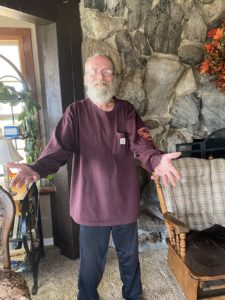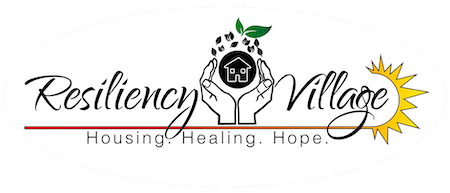 “My name is Steven Smith, and I’ve had four strokes.” This is how one long-time Resiliency Village resident often introduces himself. Steven’s story is one of great loss, resilience, and ultimately redemption. For five years before he came into shelter with the RoomKey program, and then moved to Resiliency Village, Steven lived in a series of vehicles while dealing with intense health concerns, and complicated legal struggles.
“My name is Steven Smith, and I’ve had four strokes.” This is how one long-time Resiliency Village resident often introduces himself. Steven’s story is one of great loss, resilience, and ultimately redemption. For five years before he came into shelter with the RoomKey program, and then moved to Resiliency Village, Steven lived in a series of vehicles while dealing with intense health concerns, and complicated legal struggles.
“You can’t understand it” he explains “Unless you’ve lived it.”
“I went through many vehicles,” Steven says “I’d do everything the cops would tell me to do, and do my best to avoid trouble but eventually each car would be taken and then I’d use my Social Security check to buy a new one. Thank God I did, I always had shelter.”
An $1100 monthly social security check doesn’t buy much of a vehicle, and after the purchase, there is still a need for registration, insurance, repairs, fuel, and things like tires. Steven then had to figure out how to get food, where to safely park, and how to stay current with court dates, appointments, and health care.
“All I wanted was one to run right,” Steven says of the vehicles he bought and lost to impoundment.
Before living in cars, Steven was a skilled construction worker who was seriously injured in a crane accident on the job. Substance and alcohol use followed, and resulted in his arrest. He was eligible for the Deferred Entry of Judgement (DEJ) program as the court determined his mental health issues contributed to his offense.
DEJ is a pretrial diversion program in which a defendant pleads guilty or no contest but the court defers judgment and sentencing while probation and a behavioral health program are completed. The case is dismissed upon successful completion and the arrest record can be sealed.
The stress of living in a vehicle, sleeping sitting up in the seat, and having to worry about his safety at all times eventually led to a series of strokes, adding to his major injuries from the crane accident. One night while he was sleeping upright in one of his cars his head slipped and became lodged between the headrest on the seat and the window of the vehicle. In the struggle to free himself, he ruptured his carotid artery, which resulted in his first stroke. Three more strokes followed. One of them required a medi-flight to Doctor’s Hospital in Modesto to keep him alive. He was in and out of care facilities, and in one case after being discharged he came to find the car he was living in had been impounded while he was hospitalized.
“I knew I had to lose the drugs and alcohol if I was ever to be released from the prison I made for myself.” He says “I decided I was not gonna let this get me down.”
“I made every court appearance under the fog of coming out of the strokes. The judge was impressed but he didn’t believe I had four strokes. One day he told me he knew about strokes because he had one himself and he challenged me to prove I survived four.” Steven chuckles as he goes on “When I told my doctor the judge wanted proof he got so mad he threatened to go to the courtroom and throw my whole case file at him!”
The strokes added another layer of difficulty with balance and mobility but Steven also kept every appointment he had to be compliant with court orders related to the DEJ program. “Many times I walked the tracks from the Wal-Mart parking lot to Behavioral Health to complete my program.” Steven smiles when he remembers how he was helped by a young friend who looked out for him while he was on the street. “I’ve got to give credit to Chris, he kept me going through 300 hours of community service, my court dates, and appointments. Now I’m a free man. I haven’t been in that position in a long time.”
Despite all the obstacles, Steven completed the requirements of the DEJ program and is indeed a free man. He expresses a remarkable sense of gratitude not only for how things have turned out but also for how it happened.
“God blessed me with those strokes to get me off the drugs.” He explains “The strokes rewired my brain and I lost all desire for drugs or drink. “I don’t know how much time I have left but I want to live it clean,” Steven says “I want to live happy and be at peace. I quit looking at the negative and look to the positive.”
When reflecting on the changes that have come since moving to Resiliency Village he focuses on some of the simple things. “I didn’t have a bed, I had a car. Now I have a roof over my head and a room of my own.” He smiles “Laying down in a bed is the most healing thing you can do. I get real rest. Before I always had to be on high alert – cops, people looking to do strange things are a constant threat. I can take a shower when I want, I’m not washing up in gas station or Wal-Mart restrooms.”
He pauses for a moment, reflects, and continues, “I kinda like myself. I’m a nice guy, I didn’t like it when I had to be mean. You’ve created a new man!”
Post authored by Mark Dyken
